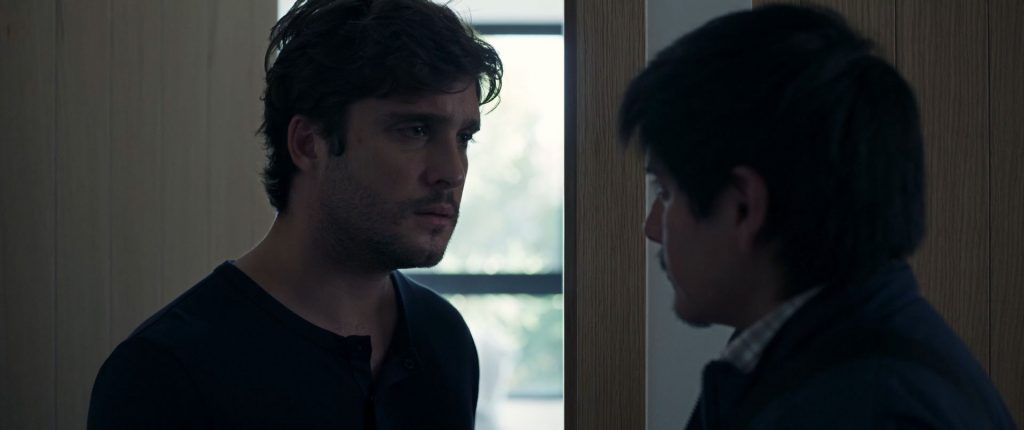January 29, 2024
by Carla Hay

Directed by Michel Franco
Culture Representation: Taking place in New York City, the dramatic film “Memory” has a predominantly white cast of characters (with a few African Americans and Latinos) representing the working-class and middle-class.
Culture Clash: A recovering alcoholic, who has traumatic memories from her past, forms an unexpected bond with a former high school classmate who has dementia.
Culture Audience: “Memory” will appeal primarily to people who are fans of stars Jessica Chastain and Peter Sarsgaard; filmmaker Michel Franco; and movies that have realistic portrayals of emotionally damaged adults.

“Memory” is a skillfully acted character study of how memories can be blocked out, preserved, or warped to shape personal self-identities or perceptions of others. This drama’s sluggish pacing drags down the movie, but it doesn’t ruin the film. And some of the film’s subject matter, such as taking care of someone with dementia or having dementia, might be triggering or upsetting for people who’ve been through those experiences. However, the movie has a powerful message about how human connections can thrive in unlikely circumstances.
Written and directed by Michel Franco, “Memory” (which was filmed on location in New York City) had its world premiere at the 2023 Venice International Film Festival, where “Memory” co-star Peter Sarsgaard won the prize for Best Actor. The movie made the rounds at other film festivals in 2023, including the Toronto International Film Festival and the BFI London Film Festival. Viewers who see the trailer for “Memory” before seeing the movie should know in advance that the trailer is somewhat misleading, because it makes “Memory” look more suspenseful than it really is.
“Memory” is told from the perspective of middle-aged Sylvia (played by Jessica Chastain), a social worker whose job is at an adult care facility for disabled and emotionally troubled people. Sylvia is a recovering alcoholic who has been sober for the past 13 years. It’s revealed later in the movie that Sylvia was a very rebellious teen who began drinking when she was an adolescent.
The movie opens with a scene of Sylvia in an Alcoholics Anonymous support group meeting, where she is highly respected, and the feeling is mutual. Sylvia is a single mother to a 15-year-old daughter named Anna (played by Brooke Timber), who is an intuitive and obedient child. Sylvia and Anna live in a small apartment in New York City’s Queens borough. They aren’t poor, but they have some financial struggles. Anna notices that their refrigerator isn’t working again, and Sylvia seems bothered that it’s another expense that will put a strain on her finances.
Sylvia doesn’t have a social life and seems every emotionally closed off to many people. At her high school reunion, she sits by herself, looking bored, and she doesn’t really talk to anyone. A man named Saul Shapiro (played by Sarsgaard), one of her former classmates, sits down at the same table and tries to start a conversation with her.
Sylvia looks very annoyed. She gets up and walks out of the building. But then, she notices that Saul is following her. He follows Sylvia on the subway all the way back to her apartment building, but she is able to get to the building’s front door before he does, and she locks it behind her. And then, Saul does something even creepier: He stands outside her apartment building like a stalker, even when it begins to rain.
Sylvia has become alarmed but she doesn’t call the police. The next morning, she sees that Saul has spent the night outside the apartment. She can see that he’s not mentally well, so she asks him for his phone and calls a number of anyone who can identify him and pick him up. Sylvia gets Saul’s protective bother Isaac (played by Josh Charles) on the phone.
Isaac explains that Saul has dementia and that Saul has episodes where he wanders off and goes to places and has no memory of how he got there. Isaac picks up Saul, but that isn’t the last time that Sylvia sees him. She calls Isaac the next day to ask to see Saul and to find out if he’s doing any better. Isaac, who is a single father, lives with teenage daughter Sara (played by Elsie Fisher), who has an almost immediate rapport with Sylvia.
Through a series of circumstances, Sylvia reluctantly accepts Isaac’s offer to be Saul’s part-time caregiver during the day. The rest of “Memory” shows the up-and-down relationship that develops between Saul and Sylvia. She is haunted by traumatic memories of her past that have affected her self-esteem and her relationships with her soft-spoken, married older sister Olivia (played by Merritt Wever) and their widowed mother Samantha (played by Jessica Harper), who has been estranged from Sylvia for years.
“Memory” is not the type of movie where healing comes easily. There are moments of self-awareness and self-sabotage that happen throughout the story. Sylvia has a tendency to be a caretaker to others, but she also has to come to an understanding that she needs a lot of emotional self-care that she has neglected. “Memory” is a testament to how people can find solace in simple moments that can have a much larger impact than expected.
Ketchup Entertainment released “Memory” in U.S. cinemas on December 22, 2023, with an expansion to more U.S. cinemas on January 5, 2024.




